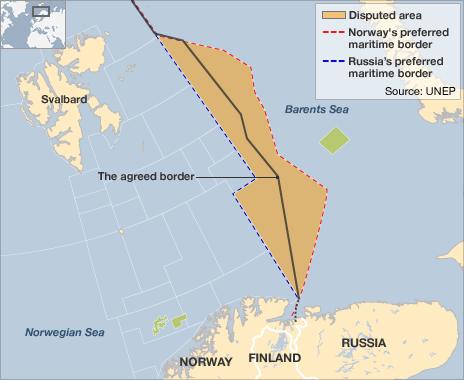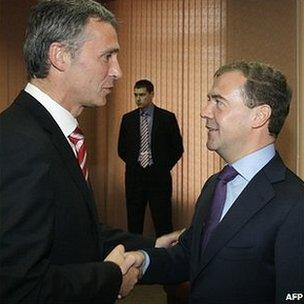Russia and Norway sign maritime border agreement
- Published

Norway and Russia have agreed on where their Arctic border should be drawn, which could boost offshore exploration.
The two nations have been locked in a dispute over a 175,000 square kilometres (67,000 square miles) area in the Barents Sea for 40 years.
Oil and gas exploration was prohibited there, while a huge part of the area was a source of conflict because of unregulated fishing.
The oil and gas reserves in the Barents Sea could be worth billions of dollars.
The treaty, signed by the foreign ministers, will now be submitted to the countries' parliaments for ratification.
Russia and Norway are among the countries eager to exploit the Arctic.
The region's reserves of oil and gas are becoming more accessible due to ice melting.
The disputed area, half the size of Germany, lies to the north off the two countries' coastlines.
'Important signal'
Russian President Dmitry Medvedev and Norway's Prime Minister Jens Stoltenberg attended the signing ceremony in the Russian city of Murmansk.
Mr Medvedev said: "Delineating the border in the region where our interests meet is a key step forward."

The two countries ended a 40-year maritime border dispute
"This will allow us to solve joint tasks constructively, as well as to work on economic development projects."
Norwegian Foreign Minister Jonas Gahr Stoere told BBC News that the treaty secured the continued co-operation on fishing between the two countries, and regulated oil and gas offshore exploration in the border zone.
A Kremlin source told Russian news agency Interfax: "Engagement in this area will be regulated by the principle of shared handling of all mineral deposits, crossed by the delimitation line."
Mr Stoere believed it would be "months rather than years" when the treaty was ratified and exploration could begin.
He also said that Russia and Norway's success in reaching the agreement was an important signal to the broader international community that there was no race in the Arctic and everything was being done in accordance with international law.
Ecologists and some members of the Norwegian coalition government worry that officials have been ignoring some environmental problems in the Arctic.
But Mr Stoere said that "great attention" had been paid to the issues.